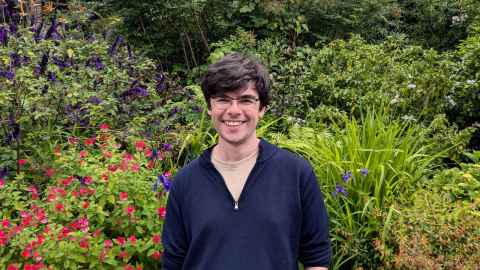Take 10 with... William Pearman
Dr William Pearman, Research Fellow with the School of Biological Sciences, gives us 10 minutes of his time to discuss his research on microbes.

1. Describe your research topic to us in 10 words or less.
How microbes influence the life and evolution of larger organisms.
2. Now explain it in everyday terms!
My research aims to understand how the microbiome (the communities of microbes that live on a larger host organism, such as humans) can influence the health and survival of that organism. This is over both a short timeframe (the life of the host) and a very long timeframe (the evolution of that host over hundreds of years). I study this using small freshwater animals called Daphnia, as well as using a lot of computer simulations.
3. Describe some of your day-to-day research activities.
Typically, I spend a lot of time at my computer analysing data from models or DNA sequencing, writing papers or grants, and planning upcoming research. But I also spend a bit of time in the lab – where I’m either rearing Daphnia, extracting DNA from various types of things, or building bits of equipment to make my life in the lab cheaper or better!
4. What do you enjoy most about your research?
The challenge – I love tackling fun and interesting questions and being in a position to choose the types of questions to answer is a massive privilege. Coming up with a research question, determining the best ways to answer it, and overcoming those challenges gives me a bit of a thrill. Perhaps it’s less exciting than skydiving but you’d ever find me doing that!
5. Tell us something that has surprised you in the course of your research.
I think the most surprising thing for me was the diverse skillset that scientists often acquire: everything from fundamental genetics and microbiology, to engineering skills, 3D modelling and chemistry. Although I’m primarily a microbiologist, I have had to learn a huge amount of chemistry to make my own reagents and DNA extraction methods. I’ve also had to learn 3D modelling skills to be able to build some of my own equipment.
6. How have you approached any challenges you’ve faced in your research?
Research is largely a challenge, in a good way, so I think recognising and appreciating the challenges has given me a better mindset for approaching them. On a more practical level there’s a quote which I like – though I don’t always listen to – “A month in the laboratory can often save an hour in the library”. Basically, making sure you understand a lot of the literature can save you a lot of time and pain. It’s true that some of the most frustrating challenges I’ve faced would have been a lot simpler if I’d spent more time reading the literature.
7. What questions have emerged as a result?
Tonnes, too many to count! The struggle I find is trying to pick which question to answer. For me the big question is: does the microbiome affect the evolution of a host, and what sorts of conditions are needed for that to happen?
8. What kind of impact do you hope your research will have?
Broadly I hope my research can provide a platform that we can use to understand and employ the microbiome in questions of conservation, climate change and agriculture. Enabling us to use, where possible, the microbiome to improve our environments and lives is dream. My research might not directly provide all the solutions, but I hope it contributes!
9. When collaborating across the faculty or University, or even outside the University, who do you work with and how does it benefit your research?
I work with a broad suite of people, currently I’m collaborating with Prof. Ellen Decaestecker at KU Leuven in Belgium, as well as folks at the University of Otago, Lincoln University, GNS and the Cawthron institute. Science is such a collaborative field – being able to leverage a range of skillsets can provide such a boost to your work! For example, at the moment I’m collaborating with Dr Derek Orbaugh and Dr Joe Ashby here at the University of Auckland to build some new lab equipment. I certainly don’t have the electrical or physics skills – but having colleagues who do, is a massive boon.
10. What one piece of advice would you give your younger, less experienced research self?
Don’t be afraid to reach out to new people – this is also advice I’d give to my present self! Trust your instincts: just because lots of people do something a certain way, that doesn’t mean you have to.